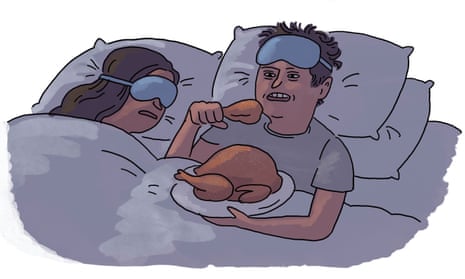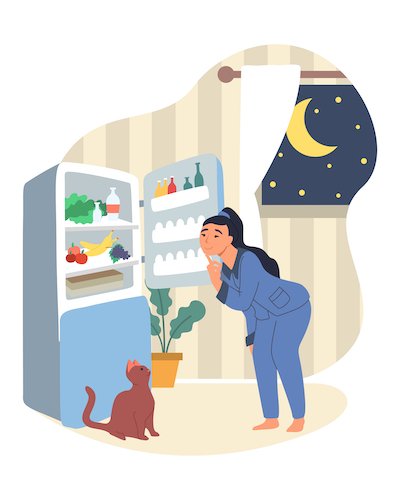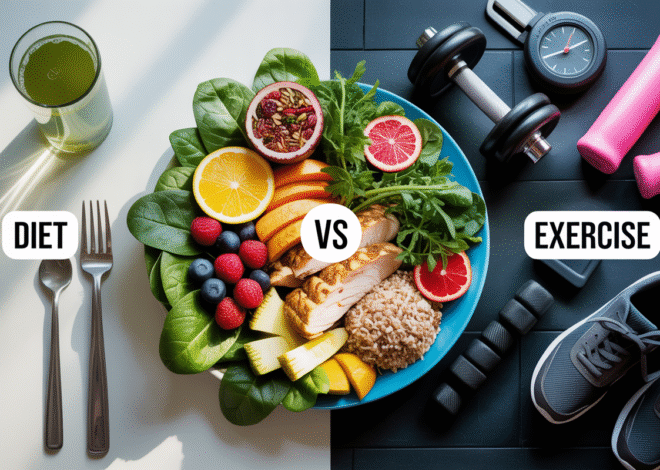Eating late at night is often linked to weight gain. But is this really true?
The answer isn’t as simple as it may seem. While some studies suggest a connection, other factors like food choices and portion sizes play a bigger role in weight management. The timing of meals has sparked much debate among health experts.
Many believe late-night eating disrupts the body’s natural rhythm, leading to weight gain. Others argue it’s not when you eat but what and how much you eat that matters most. If you’ve ever wondered whether snacking at midnight is sabotaging your health goals, this blog will provide clarity. Let’s explore the science behind late-night eating and its impact on your weight to uncover what truly matters.

Credit: www.theguardian.com
The Science Behind Late-night Eating
Eating late at night often sparks debates about its impact on weight. Many believe it automatically leads to weight gain. But is the timing of your meals really the problem? To find the answer, we need to explore the science behind late-night eating. Understanding how your body processes food and how circadian rhythms affect digestion can shed light on this topic.
How The Body Processes Food At Night
Your body doesn’t stop digesting food at night. Digestion is a continuous process that works whether you’re awake or asleep. But at night, your metabolism tends to slow down. This means your body might burn fewer calories compared to daytime. Some studies suggest that calories consumed late at night are more likely to be stored as fat. This is because your body’s energy needs are lower during rest.
Late-night meals can also disrupt your hunger hormones. High-calorie snacks or meals before bed may increase levels of ghrelin, the hunger hormone. This could lead to overeating over time, potentially causing weight gain. The body’s ability to regulate blood sugar levels may also be less efficient at night. This can result in higher blood sugar spikes after eating late meals.
Role Of Circadian Rhythms In Digestion
Your body follows a natural clock called the circadian rhythm. This rhythm influences many processes, including digestion and metabolism. During the day, your body is primed for activity and energy use. At night, it shifts focus to repair and recovery. Eating at odd hours may disrupt this natural balance.
Studies show that eating against your circadian rhythm can affect weight regulation. Late-night eating may confuse your body’s internal clock, leading to slower digestion. This could also increase fat storage and reduce the efficiency of calorie burning. Shift workers and people with irregular sleep patterns often face these challenges.
Understanding these rhythms can help you make better eating choices. Eating earlier in the evening might align better with your body’s natural processes.

Credit: theconversation.com
Calories And Timing
Does snacking after sunset lead to weight gain? Many people worry that eating late at night automatically piles on pounds. But the truth isn’t as simple as blaming the clock. Let’s break it down by looking at calories and timing.
Impact Of Total Calorie Intake
Weight gain happens when you consume more calories than your body uses. This applies whether you eat at noon, midnight, or anywhere in between. If you’re eating late but still staying within your daily calorie needs, the timing likely won’t make a difference.
On the flip side, late-night eating often leads to overeating. Imagine grabbing chips while binge-watching TV—those extra calories can sneak up on you fast. Plus, nighttime snacks are often less nutritious, like cookies or ice cream, rather than balanced meals.
Does Meal Timing Really Matter?
While calories play the biggest role, timing might still influence your health. Eating late at night can disrupt your body’s natural rhythm, especially if you’re going to bed soon after. Digestion slows down during sleep, making you feel sluggish the next day.
Some studies suggest that eating earlier helps regulate hunger hormones better. You might find that sticking to meals earlier in the day makes you less likely to crave junk food at night. Could shifting your dinner time help you feel more energetic?
Ultimately, it’s not just about the clock but your habits. Are your late-night meals planned and mindful, or are they impulsive snacks? The answer might be the key to finding a balance that works for you.
Hunger And Hormones
Late-night eating is a hot topic in the world of health. People often wonder if eating before bed leads to weight gain. The answer may lie in the science of hunger and hormones. Your body’s internal processes can influence cravings, appetite, and fat storage. Understanding these factors can help you make smarter food choices at night.
Effects Of Late-night Eating On Hunger Hormones
Eating late at night can disrupt hormone balance. Two key hormones, ghrelin and leptin, play a major role in hunger. Ghrelin, often called the “hunger hormone,” signals when you are hungry. Its levels tend to rise before meals and drop after eating. Late-night eating can lead to higher ghrelin levels, making you feel hungrier over time.
Leptin, on the other hand, helps control appetite. It signals your brain when you are full. Eating late may reduce leptin sensitivity, making it harder to feel satisfied. This can lead to overeating, especially high-calorie snacks. Over time, this pattern can contribute to weight gain.
How Stress And Sleep Affect Cravings
Stress and poor sleep can make late-night cravings worse. High stress levels increase cortisol, a hormone that can boost appetite. Cortisol often triggers cravings for sugary and fatty foods. These foods provide quick energy but can add extra calories.
Sleep deprivation also impacts hunger hormones. Lack of sleep can increase ghrelin levels and lower leptin levels. This creates a double effect, making you hungrier and less likely to feel full. Poor sleep can also weaken self-control, leading to impulsive eating decisions at night.
Managing stress and improving sleep are key to reducing late-night cravings. These small changes can support better hormone balance and healthier eating habits.
Food Choices At Night
Food choices at night can have a big impact on health. Many people crave snacks late in the evening, often reaching for unhealthy options. These choices can lead to consuming extra calories, which may contribute to weight gain. Understanding how to make better food decisions at night can help maintain a balanced diet.
Why Late-night Snacks Are Often Unhealthy
Late-night cravings usually lead to processed or sugary foods. Chips, cookies, and ice cream are common choices during these hours. These foods are high in calories and low in nutrients. They can also disrupt digestion and affect sleep quality. Emotional eating or boredom often drives these habits, not hunger. This makes it easy to overeat and store extra calories as fat.
Healthy Alternatives For Late-night Cravings
Choosing healthier snacks at night can prevent unnecessary weight gain. Opt for a small portion of Greek yogurt with berries. It’s rich in protein and low in sugar. Try a handful of unsalted nuts for healthy fats and fiber. Sliced vegetables with hummus are another satisfying option. For something warm, a small bowl of oatmeal can curb cravings. These choices keep you full without adding too many calories.
Weight Gain Myths
Does eating late at night really pack on extra pounds? This question has sparked endless debates. Many people believe that late-night snacking is the ultimate culprit behind weight gain. But is this assumption backed by science, or is it just another myth?
Debunking Common Misconceptions
The idea that eating after 8 PM automatically leads to weight gain is misleading. Your body doesn’t have a built-in clock that magically stores fat based on the time you eat. Food isn’t processed differently just because you eat it in the evening.
What matters more is how much you eat throughout the day. If you exceed your calorie needs, eating late at night may push you over the limit, but it’s not the timing that’s the issue. Think about it—if you ate a balanced meal at 9 PM but stayed within your daily calorie goal, would weight gain still occur? No.
Another misconception is the belief that late-night snacks are inherently bad for you. Not all snacks are created equal. Grabbing a handful of almonds is far different from munching on a bag of chips. Your choices matter more than the timing.
What Really Contributes To Weight Gain
Weight gain is primarily caused by consuming more calories than your body needs. It’s simple math. If your calorie intake exceeds the energy you burn, the extra calories are stored as fat.
Lifestyle factors play a huge role too. Stress, lack of sleep, and inactivity can make it harder to maintain a healthy weight. If you’re staying up late and snacking while binge-watching TV, you’re likely adding calories without even realizing it.
Consistency is key. Eating late isn’t inherently harmful, but if it becomes a habit tied to overeating or unhealthy food choices, it can contribute to weight gain. Ask yourself: are you eating because you’re hungry, or just out of boredom?
So the next time you feel guilty about that late-night snack, think about the bigger picture. What you eat and how much you eat matter far more than when you eat.
Metabolism And Late Meals
When it comes to weight management, the timing of your meals often sparks debate. A common belief is that eating late at night can disrupt your metabolism and lead to weight gain. But is it the timing of your meals, or the total calories consumed, that really matters?
Does Eating Late Slow Down Metabolism?
Your metabolism doesn’t shut off when the sun goes down. In fact, your body keeps burning calories even while you sleep. However, late-night meals can make a difference depending on what you eat and your daily habits.
If you eat heavy, calorie-dense foods late at night, it can overload your digestive system. This might leave you feeling sluggish the next morning, which could impact how active you are during the day. Less activity means fewer calories burned, which might contribute to weight gain over time.
Think about this: Are you eating late because you’re truly hungry, or is it just a habit? Identifying the reason behind your nighttime cravings can help you make smarter choices.
Nighttime Eating And Fat Storage
Eating late at night doesn’t automatically cause your body to store more fat. However, late-night snacking often involves unhealthy choices like chips, cookies, or sugary drinks. These high-calorie foods can push your daily calorie intake over your body’s needs.
If you consistently consume more calories than you burn, your body stores the excess as fat. Timing plays a smaller role compared to what and how much you eat. For example, a 300-calorie snack at 10 PM has the same impact as a 300-calorie snack at 3 PM if you’re already in a calorie surplus.
It’s also worth noting that eating late can disrupt your sleep. Poor sleep can influence hunger hormones, making you feel hungrier the next day and increasing your chances of overeating. Have you ever noticed how you crave junk food after a bad night’s sleep? That’s your body’s way of seeking quick energy.
To avoid unnecessary fat storage, focus on portion control. If you must eat late, opt for lighter options like a handful of nuts or a small bowl of yogurt.
So the next time you reach for a snack at night, ask yourself: Is this helping or hurting my health goals?
Lifestyle Factors
Eating late at night has sparked debates about its impact on weight. Lifestyle factors play a significant role in shaping eating patterns and overall health. Work schedules, sleep habits, and stress levels can influence late-night eating choices. These factors may indirectly affect weight gain and general well-being.
Work Schedules And Eating Habits
Long work hours can disrupt regular eating routines. People working night shifts or irregular hours often eat late at night. Busy schedules may lead to skipping meals during the day and overeating at night. Eating late after a hectic day can result in poor food choices like fast food or snacks. These calorie-dense options can contribute to weight gain over time.
Unstructured meal times can affect digestion and hunger signals. Eating late may confuse the body’s internal clock, impacting metabolism. Prioritizing balanced meals during the day may help reduce late-night cravings.
Sleep Quality And Its Connection To Weight
Poor sleep quality is linked to increased hunger and late-night snacking. Lack of sleep can disrupt hormones that regulate appetite, such as leptin and ghrelin. This imbalance may make you crave high-calorie foods late at night.
Studies show that insufficient sleep affects metabolism and fat storage. People who sleep fewer hours tend to gain weight over time. Eating late at night can further disturb sleep patterns, creating a cycle of poor rest and unhealthy eating habits.
Establishing a consistent sleep schedule can improve eating habits and overall health. Limiting food intake before bedtime may lead to better sleep and weight management.
Tips For Managing Late-night Eating
Late-night eating is a common habit for many people, but managing it wisely can make a big difference in your overall health and weight management. If you’re someone who frequently finds yourself reaching for snacks after dinner, you’re not alone. The good news is, there are simple strategies to help you stay on track while still satisfying those nighttime cravings.
How To Curb Nighttime Hunger
Nighttime hunger often stems from not eating enough earlier in the day. Start by ensuring your meals are filling and balanced—include proteins, healthy fats, and fiber to keep you full longer. For example, adding avocado to your lunch or snacking on nuts can keep hunger at bay.
Keep healthy snacks handy instead of reaching for chips or candy. Think fresh fruit, yogurt, or a handful of almonds. These options satisfy cravings without loading up on empty calories.
Ask yourself: Are you truly hungry or just bored? Sometimes, nighttime snacking is a habit triggered by emotions or boredom. If you’re not genuinely hungry, distract yourself with an activity like reading or a quick walk.
Creating A Balanced Eating Schedule
Consistency is key. Try setting regular meal times to prevent overeating at night. For instance, eating breakfast at 8 a.m., lunch at noon, and dinner at 6 p.m. can keep your energy steady throughout the day.
Add a small evening snack if you tend to stay up late. A slice of whole-grain toast with peanut butter or a banana can stop hunger without overloading on calories.
Plan your meals ahead so you don’t rely on random snacking. Meal prep or jotting down what you’ll eat for the day helps you stick to your schedule and avoid last-minute indulgences.
What works for you might not work for someone else. Experiment with timing and portions until you find a routine that feels natural and keeps your cravings in check.

Credit: www.sonndacatto.co.uk
Frequently Asked Questions
Will I Gain Weight By Eating Late At Night?
Eating late at night doesn’t directly cause weight gain. Weight gain occurs when you consume more calories than you burn.
Does Not Eating After 7pm Help Lose Weight?
Not eating after 7pm may reduce calorie intake, aiding weight loss. Focus on overall diet and calorie balance.
What Happens To Your Body When You Eat Very Late At Night?
Eating late at night may disrupt digestion, cause weight gain, and negatively impact sleep quality. It can increase acid reflux risk.
Do You Weigh More Late At Night?
Yes, you may weigh slightly more at night due to food, water intake, and natural body fluctuations throughout the day.
Conclusion
Eating late at night doesn’t always cause weight gain. What matters more is your overall calorie intake and activity level. Choosing healthy snacks can help avoid extra empty calories. Focus on portion sizes and mindful eating, even during late hours.
A balanced diet and regular exercise play the biggest roles in maintaining weight. Listen to your body’s hunger cues and make thoughtful food choices. Small, intentional changes can make a big difference over time. Remember, consistency is key to long-term health goals.









